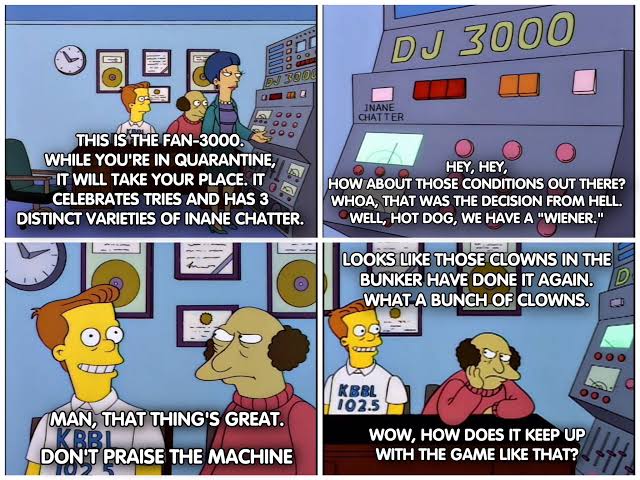
Lol all went on the same mission at the same time!!
I’m sure the solution is to use AI to filter the AI. For a price.
Good to see we’re burning the planet to make this garbage.
It’s depressing, but I think AI has some potential to be useful. Crypto on the other hand is 99.9*% cack. Useless magic beans shite.
While AI could be useful, it’s being controlled by the very worst of people and will likely be a horrible way of draining human life force into monetization for spivs, chancers and sociopaths.
2 and a quarter trillion in market capitalisation tells me that someone is finding it useful.
Laundering gotta launder
60 trillion a year swirls around the globe per year in currency based trading & trade. I’d just launder it the old fashioned way in plain sight method personally.
The swift system is incredibly antiquated and needs to be replaced. Crypto is the best option.
Crypto offers nothing at all relevant to replacing a trusted transparent banking transaction system. The blockchain tech that it’s built on, on the other hand, has a lot of potential as an immutable record keeping, Swift have been looking at it for 7 years so far without landing on a universal solution.
Swift unlocks potential of tokenisation with successful blockchain experiments | Swift
The problem seems to be variation in how partner banks want to do the record keeping, because to work, they all have to be compatible with each others blockchain solution.
My boss is a huge proponent of using blockchain to record and track waste being moved around the country. It’d be a quick and simple way to know that the truck leaving a site containing asbestos, actually arrived at the tip, rather than dumping it in someone’s backyard
You need to be careful though, the immutability of the transaction doesn’t protect against false information being added to the blockchain, only that the records, once created cannot be altered. It tends to falter with real world transactions unless they can be electronically and automatically recorded by a trustworthy monitor.
I haven’t been keeping up with the state of blockchain technology (because I want no part in the massive ponzi scheme that is crypto).
A few years back there was talk of moving away from the outrageously inefficient “proof-of-work” model (essentially burning electricity and producing waste heat and not much else) for a “proof-of-stake” model.
Has that happened with the major blockchains (Ethereum et al.) yet?
Etherium shifted 2 years ago after 6 years of trying, I read there were about 80 using it as of this year, so a drop in the ocean.
I knew that bitcoin was energy intensive, but I didn’t realise it was so much:

edit: the bars in the chart are a little misleading as it’s a logarithmic axis, but the numbers are very stark.
Per earlier posts, Etherium’s PoW is a lot better, and its PoS even more so, but still…

Source:
I have no idea how bitcoin works.
I know you have to “mine” for it, but I have no understanding of why and whats involved.
Oversimplification
Bitcoin ‘mining’ is a complex calculation which, when solved, creates 2 things, 1 - new blocks or pages on the bitcoin ‘blockchain’ which is an electronic register of bitcoin transactions and 2 - validation of existing transactions by a random participant in ‘mining’ (this is how the integrity of the records is maintained). People who solve the complex calculation are rewarded with new bitcoin (about 12.5 per correct solution, worth close to $1m AU) as an incentive.
To keep the volume of new bitcoin in check, the complexity of the calculations constantly increases and the reward halves every 210,000 solved calculations, so about every 4 years.
So, do math good, earn money?
And people use computers do do these calculations/mining, and the harder the computer works the more energy etc?
Exactly, and GPU’s are uniquely suited to the task, hence the massive rise in Nvidia’s fortunes over the past decade.
There is an element of randomness to who ‘wins’ but yeah, the more compute power the more likely you are to succeed and the more juice you use.
